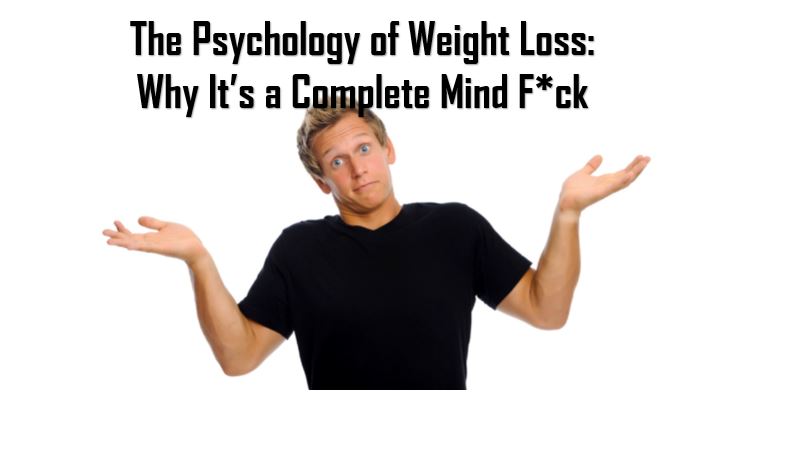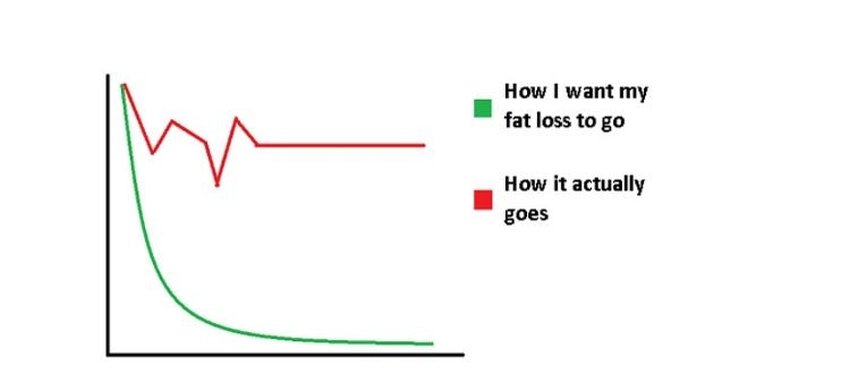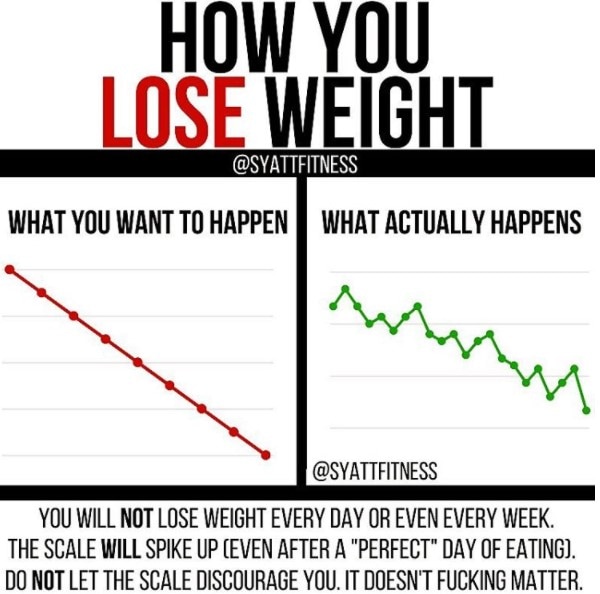The graph says it all, doesn’t it?
The painful reality of reducing body fat and losing weight is a harsh one, but it needs to be discussed.
It’s like one of those scenarios when you’re really into someone and you give them all of your time and attention, but they’re not feeling quite the same way because, well, they’re just not that into you.
For most people, that’s how dieting and fat loss goes.
Fat loss just isn’t that into you.
It’s just biology.
You may hear people who know who are attempting to drop some body fat talking about how they’re cutting carbs, going vegan, jogging everyone morning, jumping on diet bandwagons, and doing god only knows what else in an attempt to slash some fat.
If you know me, I’m not a negative person.
Far from it.
But I am a pragmatic person and I like to keep it real.
So a little forewarning, this article may sound a little discouraging to a lot of people who are trying to grasp the fat loss concept and make it work on their terms.
But truthfully, I just want to show and explain to you that losing 30 pounds of body fat (which isn’t even THAT much) is definitely not an overnight process, just like gaining those 30 pounds didn’t happen in a day; and also how there’s going to be speed bumps- actually more like mountain ranges of difficulties along the way.
The reality is: Fat loss is a process, and if you really want to make it an effective one, it’s going to take some time.
Because it’s an instance where you have to play the long game; the psychology involved will no doubt f*ck your mind at one point or another.
It’ll be like an episode of David Blaine- Street magician where he does this completely absurd wizardry and you’re like WTF, HOW!?
Yup that’s going to be you and the bathroom scale.
It’s the dark arts at it’s finest, ladies and gentlemen.
But I’m going to explain how to deal with all this mind fucking, fat loss voodoo, and how to play the long game and actually lose the weight and keep it off.
Because what good is dropping 30 pounds in a year only to put on 40 in the following 6 months?
The graph says it all, doesn’t it?
The painful reality of reducing body fat and losing weight is a harsh one, but it needs to be discussed.
It’s like one of those scenarios when you’re really into someone and you give them all of your time and attention, but they’re not feeling quite the same way because, well, they’re just not that into you.
For most people, that’s how dieting and fat loss goes.
Fat loss just isn’t that into you.
It’s just biology.
You may hear people who know who are attempting to drop some body fat talking about how they’re cutting carbs, going vegan, jogging everyone morning, jumping on diet bandwagons, and doing god only knows what else in an attempt to slash some fat.
If you know me, I’m not a negative person.
Far from it.
But I am a pragmatic person and I like to keep it real.
So a little forewarning, this article may sound a little discouraging to a lot of people who are trying to grasp the fat loss concept and make it work on their terms.
But truthfully, I just want to show and explain to you that losing 30 pounds of body fat (which isn’t even THAT much) is definitely not an overnight process, just like gaining those 30 pounds didn’t happen in a day; and also how there’s going to be speed bumps- actually more like mountain ranges of difficulties along the way.
The reality is: Fat loss is a process, and if you really want to make it an effective one, it’s going to take some time.
Because it’s an instance where you have to play the long game; the psychology involved will no doubt f*ck your mind at one point or another.
It’ll be like an episode of David Blaine- Street magician where he does this completely absurd wizardry and you’re like WTF, HOW!?
Yup that’s going to be you and the bathroom scale.
It’s the dark arts at it’s finest, ladies and gentlemen.
But I’m going to explain how to deal with all this mind fucking, fat loss voodoo, and how to play the long game and actually lose the weight and keep it off.
Because what good is dropping 30 pounds in a year only to put on 40 in the following 6 months?
PSYCHOLOGY OF ADDICTION:
“IF YOU’RE AN ALCOHOLIC YOU CAN CUT OUT DRINKING. BUT IF YOU’RE OVERWEIGHT YOU CAN’T CUT OUT FOOD.”
I heard Lyle McDonald talk about this recently on a podcast and he painted the picture beautifully.
*This isn’t to downplay the serious nature of alcoholism, but it is extremely analogous to how an overweight or obese person should approach their problem.
Alcoholics know the problem. It’s alcohol. It’s non-essential for life and it’s something they can eliminate completely.
For just about 100% of recovering alcholics, kicking the liquor is incredibly difficult at first, but becomes easier as time goes on.
For obese and overweight individuals trying to cut out high calorie foods or just reduce the amount of food they’re eating in general, it’s the opposite in fact.
At first the overweight person might not seem daunted or bothered at all about eliminating some foods or serving sizes, but overtime it will become exceedingly difficult.
Because unlike alcohol, you just can’t completely remove food from your life.
Alcohol and drugs are non essential, but food is vital.
There’s no escaping food, and for someone who has been severely restricting their food choices and calories for an extended period of time, it is incredibly easy to relapse and fall off the wagon and go on an almost endless “cheat meal bender.”
So what’s the solution for this??
Sad to say, there’s not a hard and fast rule or way to solve this one.
Food is ubiquitous. It will always be around and it’s something you’re going to have marketed and shoved in your face multiple times a day.
Meta analyses and studies have shown that rigid dieting (eliminating certain foods and only eating certain foods) can be good in getting overweight individuals to lose weight quickly, with the caveat that it creates a need to binge on “forbidden” foods when they have the chance.
It’s the physiological aspect of being told not to do something, but in fact will make you want to do it more.
Don’t believe me? Try cutting out carbs for a week, and on the 7th day tell me how bad you want to eat that box of a dozen donuts. You can tell yourself you’ll only want one, but your mind will push you to consume the entire dozen with no guilt or remorse.
A better, more sustainable way to approach dieting is the use of flexible dieting, which is not restricting any certain food group or foods, but rather basing your fat loss on the energy balance equation and incorporating foods you enjoy.
This will almost completely eliminate any desire to binge eat.
If you’re allowing yourself to enjoy a donut every now and then and stay within your fat loss daily calories, you’ll never have the urge to destroy an entire dozen donuts in a single sitting.
Once again, this is playing the long game.
In a snap shot, rigid dieting may look like it “works.” And it can if you’re an extremely disciplined and motivated individual. But for the rest of us, that snap shot will yield results, but look past that snap shot and you’ll find binge eating, benders, and large amounts of body fat being regained.
This almost certainly doesn’t happen when you allow yourself some flexibility in your food choices.
I heard Lyle McDonald talk about this recently on a podcast and he painted the picture beautifully.
*This isn’t to downplay the serious nature of alcoholism, but it is extremely analogous to how an overweight or obese person should approach their problem.
Alcoholics know the problem. It’s alcohol. It’s non-essential for life and it’s something they can eliminate completely.
For just about 100% of recovering alcholics, kicking the liquor is incredibly difficult at first, but becomes easier as time goes on.
For obese and overweight individuals trying to cut out high calorie foods or just reduce the amount of food they’re eating in general, it’s the opposite in fact.
At first the overweight person might not seem daunted or bothered at all about eliminating some foods or serving sizes, but overtime it will become exceedingly difficult.
Because unlike alcohol, you just can’t completely remove food from your life.
Alcohol and drugs are non essential, but food is vital.
There’s no escaping food, and for someone who has been severely restricting their food choices and calories for an extended period of time, it is incredibly easy to relapse and fall off the wagon and go on an almost endless “cheat meal bender.”
So what’s the solution for this??
Sad to say, there’s not a hard and fast rule or way to solve this one.
Food is ubiquitous. It will always be around and it’s something you’re going to have marketed and shoved in your face multiple times a day.
Meta analyses and studies have shown that rigid dieting (eliminating certain foods and only eating certain foods) can be good in getting overweight individuals to lose weight quickly, with the caveat that it creates a need to binge on “forbidden” foods when they have the chance.
It’s the physiological aspect of being told not to do something, but in fact will make you want to do it more.
Don’t believe me? Try cutting out carbs for a week, and on the 7th day tell me how bad you want to eat that box of a dozen donuts. You can tell yourself you’ll only want one, but your mind will push you to consume the entire dozen with no guilt or remorse.
A better, more sustainable way to approach dieting is the use of flexible dieting, which is not restricting any certain food group or foods, but rather basing your fat loss on the energy balance equation and incorporating foods you enjoy.
This will almost completely eliminate any desire to binge eat.
If you’re allowing yourself to enjoy a donut every now and then and stay within your fat loss daily calories, you’ll never have the urge to destroy an entire dozen donuts in a single sitting.
Once again, this is playing the long game.
In a snap shot, rigid dieting may look like it “works.” And it can if you’re an extremely disciplined and motivated individual. But for the rest of us, that snap shot will yield results, but look past that snap shot and you’ll find binge eating, benders, and large amounts of body fat being regained.
This almost certainly doesn’t happen when you allow yourself some flexibility in your food choices.
THE BATHROOM SCALE IS KEEPING SECRETS FROM YOU.
Maybe I shouldn’t say secrets.
Some might say it’s lying to you.
But in order to lie, you have to have all the information.
In defense of the scale, it’s not lying because it doesn’t’ have all of the proper information.
The scale just gives you a read out of the point load that’s placed upon it.
It doesn’t know anything else, so actually, let’s applaud the scale for doing a good job and its only job!
But the scale doesn’t know the dozens of variables that go into tracking and measuring fat loss.
It doesn’t know if you’re male or female.
It doesn’t know the last time you went to the bathroom.
It doesn’t know how much food you ate in the meal prior to weighing yourself.
It doesn’t know your stress levels.
It doesn’t know what week of your monthly cycle you’re on if you’re a woman.
It doesn’t know how little sleep you’ve been getting because you’re working overtime to feed your family.
It doesn’t know you’re dehydrated.
It doesn’t know you ate a jar of pickles yesterday and you’re extremely bloated.
It doesn’t know you’ve been traveling for a week straight.
I think you get the idea.
Whether you know it or not, these are all major variables in measuring fat loss.
And you expect a load measurement device that has one job to account for all of this data??
Fat loss progress is best measured by taking visual and physical assessments of your body composition over time.
Are your clothes fitting a bit looser than they used to?
Are your arm, leg, and waist circumferences getting smaller?
Even if the read out on the scale hasn’t changed, these physical metrics will be way more effective tools in tracking your progress.
YOU THINK YOUR DIET IS TEMPORARY
This is a huge mind block that so many people have yet to overcome. If you still think your diet is some means to an end, you will not be successful.
“I just have to do this damn diet until I’m back down to my old weight”….what do you think will happen once you get down to that weight and go back to the way you were eating?….Probably go back to being overweight, except you lost muscle and fat on that “damn diet”, and now you’re going to gain only fat. Every time you do this, you slow your metabolism and make it harder and harder to lose weight.
Ditch this mindset now if you ever want to be successful achieving the body you want. I think many people have this mentality because they also have all the other mindsets I’m talking about.
Perhaps if you didn’t view weight loss as this miserable all or nothing, self deprivation act then you wouldn’t be so scared to commit to the long term.
You can still go out to eat at restaurants, grab a beer with friends, eat your birthday cake, all while losing weight and getting healthier.
“I just have to do this damn diet until I’m back down to my old weight”….what do you think will happen once you get down to that weight and go back to the way you were eating?….Probably go back to being overweight, except you lost muscle and fat on that “damn diet”, and now you’re going to gain only fat. Every time you do this, you slow your metabolism and make it harder and harder to lose weight.
Ditch this mindset now if you ever want to be successful achieving the body you want. I think many people have this mentality because they also have all the other mindsets I’m talking about.
Perhaps if you didn’t view weight loss as this miserable all or nothing, self deprivation act then you wouldn’t be so scared to commit to the long term.
You can still go out to eat at restaurants, grab a beer with friends, eat your birthday cake, all while losing weight and getting healthier.



